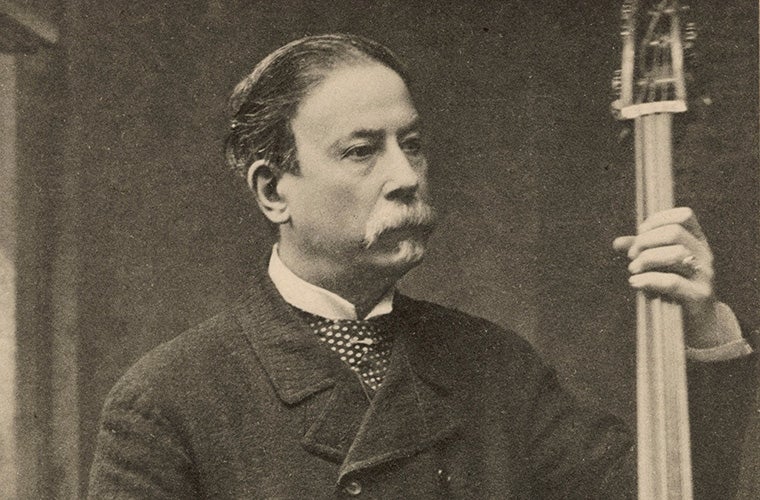
Giovanni Bottesini
1821 - 1889
Biography
Giovanni Bottesini was the first double bass player in the history of the instrument to achieve international recognition. He travelled extensively, and accounts of his playing abounded in superlatives, to the extent that he became acclaimed as 'The Paganini of the Double Bass.' However, his accomplishments transcended the instrument. In addition to his astonishing virtuosity, Bottesini was also a prolific composer, and a respected conductor.
His output as a composer exceeds two hundred and fifty works, including 48 works for double bass, other instrumental music, chamber music, vocal music, fourteen operas, a mass, a devotional oratorio, ballet, and orchestral music. As a conductor, Bottesini held important positions in Paris, Madrid, Barcelona, Naples, Turin, Cairo, and Buenos Aires, and conducted the Covent Garden Promenade concerts in London, the forerunner of the BBC Proms.
Bottesini was born into a musical family in Crema, near Cremona, on December 22, 1821. His father, Pietro, was a clarinetist and composer, and his uncle, Carlo Cogliati, taught Bottesini the violin from the age of four.
In 1835 Bottesini won a scholarship to study the double bass at the Milan Conservatoire. He progressed extraordinarily rapidly under the guidance of Professor Luigi Rossi and left the Conservatoire in 1839 – three years earlier than was then traditional – to concentrate on composition. It was also at this time that he bought the famous Testore double bass that would become his partner for life.
The major turning point in Bottesini's career came in 1846 and 47, when he travelled to Havana as principal bass with the Italian Opera Company. The captivating virtuosity and musicality of his performances of operatic fantasias and other showpieces during the intervals of opera performances, and at musical soirées, set Bottesini on the path to stardom. His solo performances were so keenly anticipated, they often ensured sold out opera performances.
Amongst Bottesini's compositions for double bass there are fantasias on themes from the operas I Puritani, La Sonnambula, Lucia di Lammermoor, La Molinara, Norma, Beatrice di Tenda and La Straniera, the balletic Cerrito fantasy, other showpieces, an assortment of transcriptions, including Bach's Air on the G-string, three solo concertos, sinfonia concertantes with violin, cello and clarinet, concertante works for two double basses, and duos for two double basses.
He also wrote A Complete Method for the Double Bass in which he outlines his distinctive approach to music. The succinct preface defines his fundamental ideals: 'Truth for science – beauty for art &3150; usefulness for the pupil'.
Bottesini visited the UK for the first time in 1849, and by the time he made his final tour in 1888, he had given around 800 concerts throughout the country, with distinguished instrumentalists including Wieniawski, Sivori, Piatti, and Joachim. His performances were rapturously received wherever he went, and in a review for Truth magazine, the Revd. H.R. Haweis writes that Bottesini 'simply extinguished everyone else on stage.'
Bottesini's fame as a conductor still rests solely on the fact that he conducted the premiere of Aida in Cairo in 1871, but he commanded a large repertoire of operas by major composers such as Verdi, Gounod, Rossini, and Donizetti, and was himself the composer of 14 operas, ten of which were performed during his lifetime. Some enjoyed such extraordinary success that it is surprising they have not found a place in the standard repertoire.
Bottesini's comic opera, Alì Babà, was a triumph at the Lyceum in London in 1871. It received 20 performances, and the Daily Telegraph reported how 'the performance was attended by a running fire of applause, how Signor Bottesini received as many ovations as there are acts in his opera. Enough that no work ever had a more demonstrative welcome than Alì Babà.'
Additionally, although opera was the dominant musical form in Italy during the nineteenth century, Bottesini pursued a passion for chamber music. He co-founded the Società del Quartetto in Milan in 1861, and in Naples in 1862, and composed at least six string quartets. Number three in D major won the Basevi competition in Florence, and his four string quintets, one with double bass, stunningly magnify the power of his creative flair.
Bottesini was careless with money. He earned and spent vast sums, indulged a passion for gambling, gave generously to the poor, and maintained homes in Cairo and Italy. He died virtually penniless, of cirrhosis, on July 7, 1889, shortly after taking up the position of director of the Conservatoire in Parma, on the recommendation of his friend Giuseppe Verdi, who wrote: 'The loss of this illustrious artist is a calamity for art and I feel the deepest pain from it.'
Bottesini revolutionised double bass playing – his compositions for double bass provide the bedrock of the instrument's solo repertoire and remain the yardstick by which all aspiring virtuosi are judged.
Biography by Leon Bosch